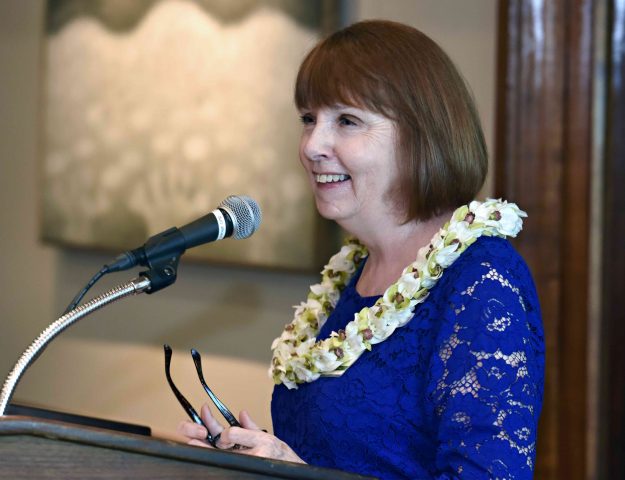Dean Receives 2020 Champion of Pharmacy Award
Courtesy of Kawili Laau, The Daniel K. Inouye College of Pharmacy at the University of Hawaii at Hilo
Published in the Summer 2020, Volume 12, Issue 2
For her work in fostering collaborative, interdisciplinary healthcare education and community outreach programs throughout Hawaii, Dean Mary Boland has been named Champion of Pharmacy for Summer 2020.
No one healthcare provider is the expert. It takes a team to understand the life context of patients – doctors, nurses, therapists, pharmacists and others, all working together.

That’s the collaborative philosophy that Mary Boland has embraced over several decades of work in nursing education. She applied an interdisciplinary approach to her work as Dean and professor of the Nancy Atmospera-Walch School of Nursing at the University of Hawaii at Manoa over the last 15 years.
In several projects, those collaborations have included pharmacists. “In recent years we’ve seen the role of the clinical pharmacist be merged onto the primary care team. They are well trained to provide support, especially when patients are dealing with one or more chronic diseases and there are multiple drug prescriptions to be monitored.”
Boland sees pharmacists playing an important part in delivering more consumer-focused health care. That’s why she looked to involve the Daniel K. Inouye College of Pharmacy in the activity of the nationally accredited UH Translational Health Science Simulation Center. “We were looking for other partners for involvement in lab simulations, and pharmacy students were a logical fit, for example, helping to manage the medications of patients being discharged from the hospital,” she says. “That’s especially important for elderly patients who often have several different prescriptions to manage.”
DKICP faculty have also been involved for several years in co-teaching classes within the School of Nursing, adds Boland. “Pharmacology is a subject that’s critical for nurses – knowing when certain drugs should be used and being aware of common side effects. Co-teaching these classes has worked really well by making use of the skill set offered by pharmacy faculty.”
Another interdisciplinary project Boland spearheaded in 2014 was partnering with the Hawaii Department of Education to create the Hawaii Keiki Program, designed to improve student success by providing on-campus nursing and health services. At one urban middle school, a team of faculty and students from UH nursing, dental hygiene, child psychiatry, pharmacy and social work are on campus once a week. They learn from each other, while providing support to the school and rapid assessment of health conditions impacting student success.
“Hawaii public schools did not have school nurses on campus,” she explains. “This project – Hawaii Keiki: Healthy and Ready to Learn – is a way to address some of the unmet healthcare needs of school-age children. It helps them be healthier and, in turn, do better in school.”
Working on healthcare teams provides upper-level college students with field experience under faculty supervision, she says. “This kind of learning is key in showing our students the value of working as a team to deliver the best care possible for patients.”
